Shijie Xia
AgencyBench: Benchmarking the Frontiers of Autonomous Agents in 1M-Token Real-World Contexts
Jan 16, 2026Abstract:Large Language Models (LLMs) based autonomous agents demonstrate multifaceted capabilities to contribute substantially to economic production. However, existing benchmarks remain focused on single agentic capability, failing to capture long-horizon real-world scenarios. Moreover, the reliance on human-in-the-loop feedback for realistic tasks creates a scalability bottleneck, hindering automated rollout collection and evaluation. To bridge this gap, we introduce AgencyBench, a comprehensive benchmark derived from daily AI usage, evaluating 6 core agentic capabilities across 32 real-world scenarios, comprising 138 tasks with specific queries, deliverables, and rubrics. These scenarios require an average of 90 tool calls, 1 million tokens, and hours of execution time to resolve. To enable automated evaluation, we employ a user simulation agent to provide iterative feedback, and a Docker sandbox to conduct visual and functional rubric-based assessment. Experiments reveal that closed-source models significantly outperform open-source models (48.4% vs 32.1%). Further analysis reveals significant disparities across models in resource efficiency, feedback-driven self-correction, and specific tool-use preferences. Finally, we investigate the impact of agentic scaffolds, observing that proprietary models demonstrate superior performance within their native ecosystems (e.g., Claude-4.5-Opus via Claude-Agent-SDK), while open-source models exhibit distinct performance peaks, suggesting potential optimization for specific execution frameworks. AgencyBench serves as a critical testbed for next-generation agents, highlighting the necessity of co-optimizing model architecture with agentic frameworks. We believe this work sheds light on the future direction of autonomous agents, and we release the full benchmark and evaluation toolkit at https://github.com/GAIR-NLP/AgencyBench.
Interaction as Intelligence Part II: Asynchronous Human-Agent Rollout for Long-Horizon Task Training
Nov 03, 2025Abstract:Large Language Model (LLM) agents have recently shown strong potential in domains such as automated coding, deep research, and graphical user interface manipulation. However, training them to succeed on long-horizon, domain-specialized tasks remains challenging. Current methods primarily fall into two categories. The first relies on dense human annotations through behavior cloning, which is prohibitively expensive for long-horizon tasks that can take days or months. The second depends on outcome-driven sampling, which often collapses due to the rarity of valid positive trajectories on domain-specialized tasks. We introduce Apollo, a sampling framework that integrates asynchronous human guidance with action-level data filtering. Instead of requiring annotators to shadow every step, Apollo allows them to intervene only when the agent drifts from a promising trajectory, by providing prior knowledge, strategic advice, etc. This lightweight design makes it possible to sustain interactions for over 30 hours and produces valuable trajectories at a lower cost. Apollo then applies supervision control to filter out sub-optimal actions and prevent error propagation. Together, these components enable reliable and effective data collection in long-horizon environments. To demonstrate the effectiveness of Apollo, we evaluate it using InnovatorBench. Our experiments show that when applied to train the GLM-4.5 model on InnovatorBench, Apollo achieves more than a 50% improvement over the untrained baseline and a 28% improvement over a variant trained without human interaction. These results highlight the critical role of human-in-the-loop sampling and the robustness of Apollo's design in handling long-horizon, domain-specialized tasks.
InnovatorBench: Evaluating Agents' Ability to Conduct Innovative LLM Research
Nov 03, 2025



Abstract:AI agents could accelerate scientific discovery by automating hypothesis formation, experiment design, coding, execution, and analysis, yet existing benchmarks probe narrow skills in simplified settings. To address this gap, we introduce InnovatorBench, a benchmark-platform pair for realistic, end-to-end assessment of agents performing Large Language Model (LLM) research. It comprises 20 tasks spanning Data Construction, Filtering, Augmentation, Loss Design, Reward Design, and Scaffold Construction, which require runnable artifacts and assessment of correctness, performance, output quality, and uncertainty. To support agent operation, we develop ResearchGym, a research environment offering rich action spaces, distributed and long-horizon execution, asynchronous monitoring, and snapshot saving. We also implement a lightweight ReAct agent that couples explicit reasoning with executable planning using frontier models such as Claude-4, GPT-5, GLM-4.5, and Kimi-K2. Our experiments demonstrate that while frontier models show promise in code-driven research tasks, they struggle with fragile algorithm-related tasks and long-horizon decision making, such as impatience, poor resource management, and overreliance on template-based reasoning. Furthermore, agents require over 11 hours to achieve their best performance on InnovatorBench, underscoring the benchmark's difficulty and showing the potential of InnovatorBench to be the next generation of code-based research benchmark.
Generative AI Act II: Test Time Scaling Drives Cognition Engineering
Apr 21, 2025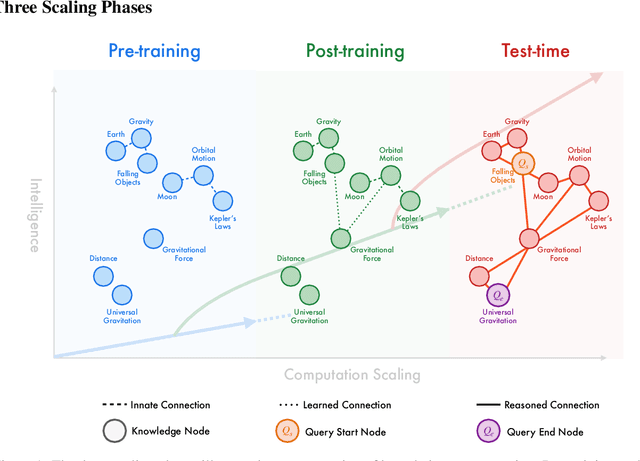
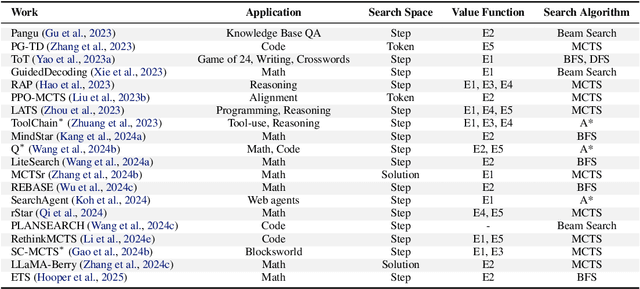
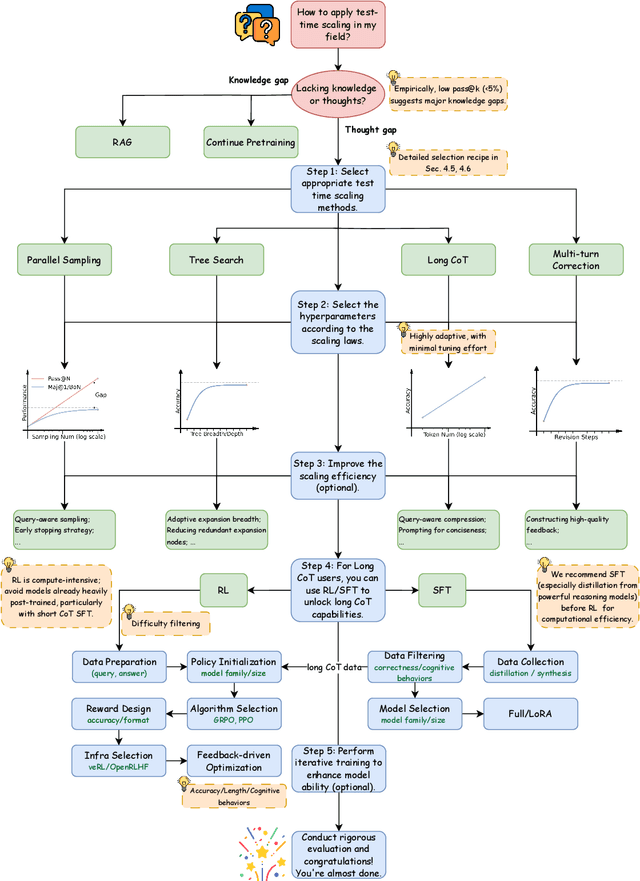
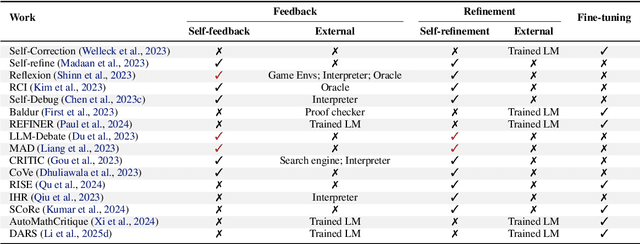
Abstract:The first generation of Large Language Models - what might be called "Act I" of generative AI (2020-2023) - achieved remarkable success through massive parameter and data scaling, yet exhibited fundamental limitations such as knowledge latency, shallow reasoning, and constrained cognitive processes. During this era, prompt engineering emerged as our primary interface with AI, enabling dialogue-level communication through natural language. We now witness the emergence of "Act II" (2024-present), where models are transitioning from knowledge-retrieval systems (in latent space) to thought-construction engines through test-time scaling techniques. This new paradigm establishes a mind-level connection with AI through language-based thoughts. In this paper, we clarify the conceptual foundations of cognition engineering and explain why this moment is critical for its development. We systematically break down these advanced approaches through comprehensive tutorials and optimized implementations, democratizing access to cognition engineering and enabling every practitioner to participate in AI's second act. We provide a regularly updated collection of papers on test-time scaling in the GitHub Repository: https://github.com/GAIR-NLP/cognition-engineering
LIMO: Less is More for Reasoning
Feb 05, 2025Abstract:We present a fundamental discovery that challenges our understanding of how complex reasoning emerges in large language models. While conventional wisdom suggests that sophisticated reasoning tasks demand extensive training data (>100,000 examples), we demonstrate that complex mathematical reasoning abilities can be effectively elicited with surprisingly few examples. Through comprehensive experiments, our proposed model LIMO demonstrates unprecedented performance in mathematical reasoning. With merely 817 curated training samples, LIMO achieves 57.1% accuracy on AIME and 94.8% on MATH, improving from previous SFT-based models' 6.5% and 59.2% respectively, while only using 1% of the training data required by previous approaches. LIMO demonstrates exceptional out-of-distribution generalization, achieving 40.5% absolute improvement across 10 diverse benchmarks, outperforming models trained on 100x more data, challenging the notion that SFT leads to memorization rather than generalization. Based on these results, we propose the Less-Is-More Reasoning Hypothesis (LIMO Hypothesis): In foundation models where domain knowledge has been comprehensively encoded during pre-training, sophisticated reasoning capabilities can emerge through minimal but precisely orchestrated demonstrations of cognitive processes. This hypothesis posits that the elicitation threshold for complex reasoning is determined by two key factors: (1) the completeness of the model's encoded knowledge foundation during pre-training, and (2) the effectiveness of post-training examples as "cognitive templates" that show the model how to utilize its knowledge base to solve complex reasoning tasks. To facilitate reproducibility and future research in data-efficient reasoning, we release LIMO as a comprehensive open-source suite at https://github.com/GAIR-NLP/LIMO.
PC Agent: While You Sleep, AI Works -- A Cognitive Journey into Digital World
Dec 23, 2024



Abstract:Imagine a world where AI can handle your work while you sleep - organizing your research materials, drafting a report, or creating a presentation you need for tomorrow. However, while current digital agents can perform simple tasks, they are far from capable of handling the complex real-world work that humans routinely perform. We present PC Agent, an AI system that demonstrates a crucial step toward this vision through human cognition transfer. Our key insight is that the path from executing simple "tasks" to handling complex "work" lies in efficiently capturing and learning from human cognitive processes during computer use. To validate this hypothesis, we introduce three key innovations: (1) PC Tracker, a lightweight infrastructure that efficiently collects high-quality human-computer interaction trajectories with complete cognitive context; (2) a two-stage cognition completion pipeline that transforms raw interaction data into rich cognitive trajectories by completing action semantics and thought processes; and (3) a multi-agent system combining a planning agent for decision-making with a grounding agent for robust visual grounding. Our preliminary experiments in PowerPoint presentation creation reveal that complex digital work capabilities can be achieved with a small amount of high-quality cognitive data - PC Agent, trained on just 133 cognitive trajectories, can handle sophisticated work scenarios involving up to 50 steps across multiple applications. This demonstrates the data efficiency of our approach, highlighting that the key to training capable digital agents lies in collecting human cognitive data. By open-sourcing our complete framework, including the data collection infrastructure and cognition completion methods, we aim to lower the barriers for the research community to develop truly capable digital agents.
O1 Replication Journey -- Part 2: Surpassing O1-preview through Simple Distillation, Big Progress or Bitter Lesson?
Nov 25, 2024Abstract:This paper presents a critical examination of current approaches to replicating OpenAI's O1 model capabilities, with particular focus on the widespread but often undisclosed use of knowledge distillation techniques. While our previous work explored the fundamental technical path to O1 replication, this study reveals how simple distillation from O1's API, combined with supervised fine-tuning, can achieve superior performance on complex mathematical reasoning tasks. Through extensive experiments, we show that a base model fine-tuned on simply tens of thousands of samples O1-distilled long-thought chains outperforms O1-preview on the American Invitational Mathematics Examination (AIME) with minimal technical complexity. Moreover, our investigation extends beyond mathematical reasoning to explore the generalization capabilities of O1-distilled models across diverse tasks: hallucination, safety and open-domain QA. Notably, despite training only on mathematical problem-solving data, our models demonstrated strong generalization to open-ended QA tasks and became significantly less susceptible to sycophancy after fine-tuning. We deliberately make this finding public to promote transparency in AI research and to challenge the current trend of obscured technical claims in the field. Our work includes: (1) A detailed technical exposition of the distillation process and its effectiveness, (2) A comprehensive benchmark framework for evaluating and categorizing O1 replication attempts based on their technical transparency and reproducibility, (3) A critical discussion of the limitations and potential risks of over-relying on distillation approaches, our analysis culminates in a crucial bitter lesson: while the pursuit of more capable AI systems is important, the development of researchers grounded in first-principles thinking is paramount.
SAFETY-J: Evaluating Safety with Critique
Jul 25, 2024Abstract:The deployment of Large Language Models (LLMs) in content generation raises significant safety concerns, particularly regarding the transparency and interpretability of content evaluations. Current methods, primarily focused on binary safety classifications, lack mechanisms for detailed critique, limiting their utility for model improvement and user trust. To address these limitations, we introduce SAFETY-J, a bilingual generative safety evaluator for English and Chinese with critique-based judgment. SAFETY-J utilizes a robust training dataset that includes diverse dialogues and augmented query-response pairs to assess safety across various scenarios comprehensively. We establish an automated meta-evaluation benchmark that objectively assesses the quality of critiques with minimal human intervention, facilitating scalable and continuous improvement. Additionally, SAFETY-J employs an iterative preference learning technique to dynamically refine safety assessments based on meta-evaluations and critiques. Our evaluations demonstrate that SAFETY-J provides more nuanced and accurate safety evaluations, thereby enhancing both critique quality and predictive reliability in complex content scenarios. To facilitate further research and application, we open-source SAFETY-J's training protocols, datasets, and code at \url{https://github.com/GAIR-NLP/Safety-J}.
OlympicArena Medal Ranks: Who Is the Most Intelligent AI So Far?
Jun 26, 2024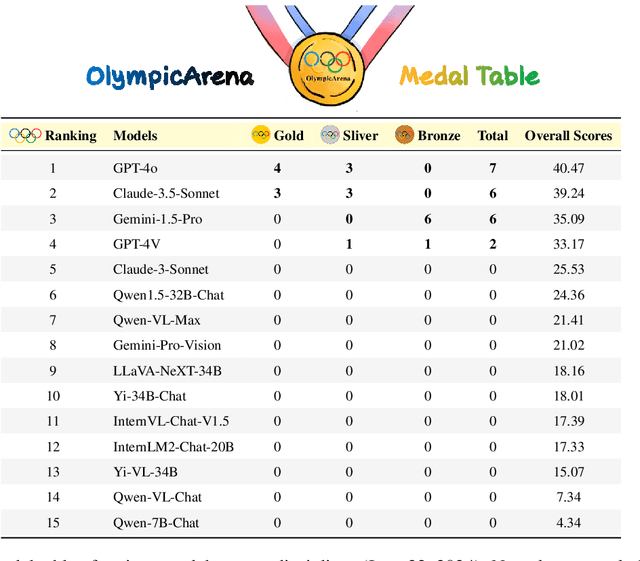
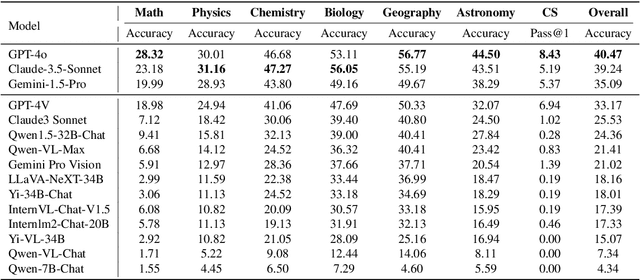
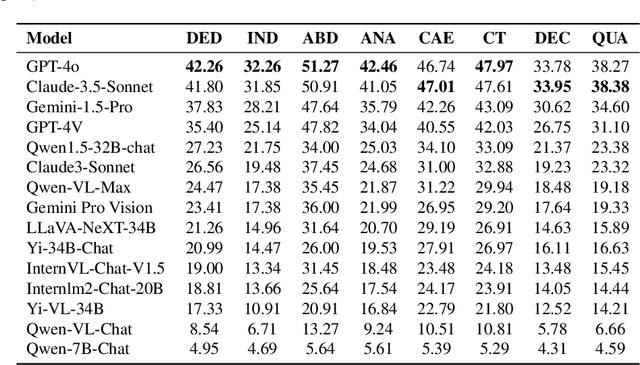
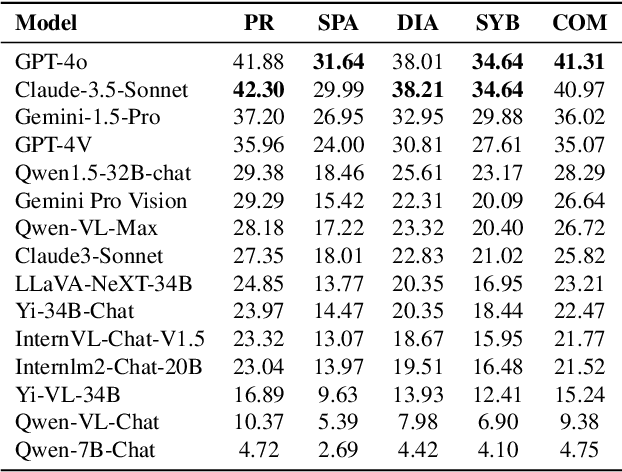
Abstract:In this report, we pose the following question: Who is the most intelligent AI model to date, as measured by the OlympicArena (an Olympic-level, multi-discipline, multi-modal benchmark for superintelligent AI)? We specifically focus on the most recently released models: Claude-3.5-Sonnet, Gemini-1.5-Pro, and GPT-4o. For the first time, we propose using an Olympic medal Table approach to rank AI models based on their comprehensive performance across various disciplines. Empirical results reveal: (1) Claude-3.5-Sonnet shows highly competitive overall performance over GPT-4o, even surpassing GPT-4o on a few subjects (i.e., Physics, Chemistry, and Biology). (2) Gemini-1.5-Pro and GPT-4V are ranked consecutively just behind GPT-4o and Claude-3.5-Sonnet, but with a clear performance gap between them. (3) The performance of AI models from the open-source community significantly lags behind these proprietary models. (4) The performance of these models on this benchmark has been less than satisfactory, indicating that we still have a long way to go before achieving superintelligence. We remain committed to continuously tracking and evaluating the performance of the latest powerful models on this benchmark (available at https://github.com/GAIR-NLP/OlympicArena).
OlympicArena: Benchmarking Multi-discipline Cognitive Reasoning for Superintelligent AI
Jun 18, 2024
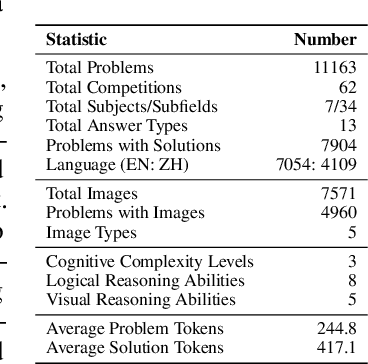
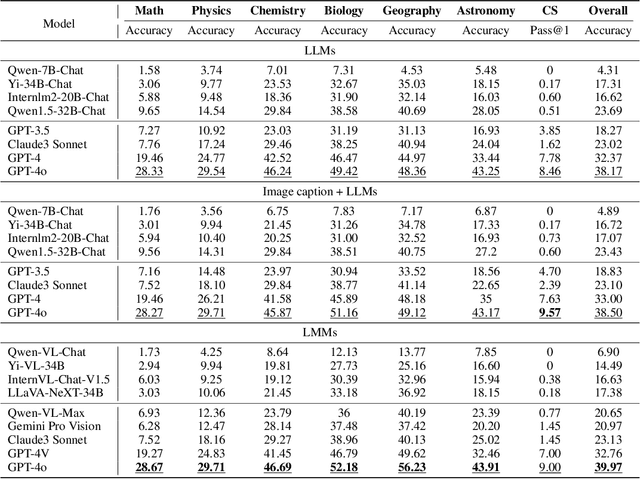
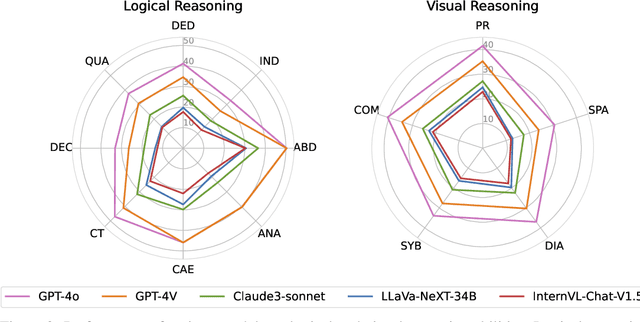
Abstract:The evolution of Artificial Intelligence (AI) has been significantly accelerated by advancements in Large Language Models (LLMs) and Large Multimodal Models (LMMs), gradually showcasing potential cognitive reasoning abilities in problem-solving and scientific discovery (i.e., AI4Science) once exclusive to human intellect. To comprehensively evaluate current models' performance in cognitive reasoning abilities, we introduce OlympicArena, which includes 11,163 bilingual problems across both text-only and interleaved text-image modalities. These challenges encompass a wide range of disciplines spanning seven fields and 62 international Olympic competitions, rigorously examined for data leakage. We argue that the challenges in Olympic competition problems are ideal for evaluating AI's cognitive reasoning due to their complexity and interdisciplinary nature, which are essential for tackling complex scientific challenges and facilitating discoveries. Beyond evaluating performance across various disciplines using answer-only criteria, we conduct detailed experiments and analyses from multiple perspectives. We delve into the models' cognitive reasoning abilities, their performance across different modalities, and their outcomes in process-level evaluations, which are vital for tasks requiring complex reasoning with lengthy solutions. Our extensive evaluations reveal that even advanced models like GPT-4o only achieve a 39.97% overall accuracy, illustrating current AI limitations in complex reasoning and multimodal integration. Through the OlympicArena, we aim to advance AI towards superintelligence, equipping it to address more complex challenges in science and beyond. We also provide a comprehensive set of resources to support AI research, including a benchmark dataset, an open-source annotation platform, a detailed evaluation tool, and a leaderboard with automatic submission features.
 Add to Chrome
Add to Chrome Add to Firefox
Add to Firefox Add to Edge
Add to Edge